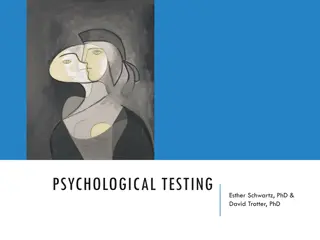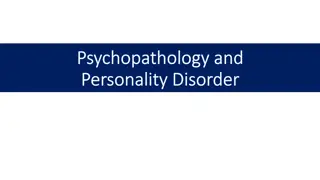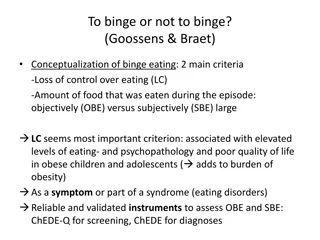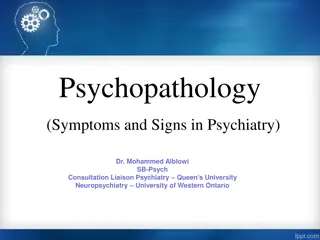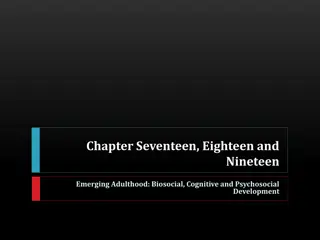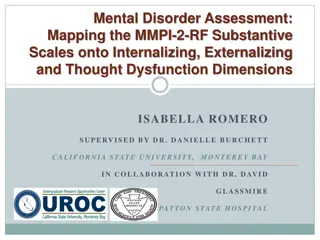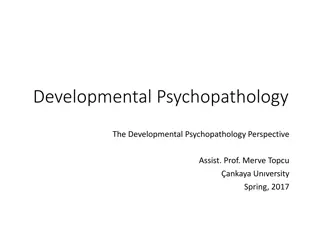Psychological Assessment and Testing Overview
Psychological testing is a vital component of psychological assessment, used to evaluate intelligence, achievement, personality, and psychopathology. This involves gathering information, administering standardized tests, and interpreting results to make diagnoses and recommendations. However, there
0 views • 25 slides
Understanding Psychopathology and Diagnostic Systems in Mental Health
Psychopathology encompasses the study of mental illness and distress, with psychiatrists and clinical psychologists deeply involved in diagnosis and treatment. Signs of psychopathology can include mood changes, excessive worry, and withdrawal from activities. Diagnostic systems like DSM-5, ICD-11, a
0 views • 22 slides
Understanding Anorexia Nervosa: Symptoms and Psychopathology
Anorexia nervosa is a serious eating disorder characterized by food restriction, bingeing, purging, and distorted body image. Common symptoms include excessive exercise, body checking, and rigid food rules. Psychopathology aspects include intrusive dread of fatness, self-imposed low weight threshold
0 views • 42 slides
Understanding Binge Eating in Children and Adolescents: Implications for Obesity Practitioners
Conceptualizing binge eating in young individuals involves criteria like loss of control over eating and the amount of food consumed. The prevalence of binge eating varies based on definitions and assessment methods, with non-treatment seekers showing lower rates than treatment seekers. The developm
0 views • 5 slides
Understanding Psychopathology: Insights from Psychiatry Seminars
Delve into the world of psychopathology with insights from Psychiatry Seminars conducted by Prof. MUDr. Tom Kaprek, Ph.D. Explore the domains of psychopathology, learning outcomes, norms vs. pathology, and key concepts related to perception and abnormal autonomy. Gain knowledge on personality, affec
0 views • 57 slides
Understanding Psychopathology: Symptoms and Signs in Psychiatry
Psychopathology involves the study of symptoms and signs in psychiatry, where signs are objective observations and symptoms are subjective experiences. Mental disorders encompass a range of issues affecting thoughts, emotions, behaviors, and relationships. Recognizing signs and symptoms such as slee
0 views • 31 slides
Insights on Emerging Adulthood and Psychosocial Development
Delve into the unique stage of emerging adulthood, spanning ages 18-25, characterized by factors like delayed marriage, higher education pursuits, and vocational instability. Explore themes of homeostasis, risk-taking behavior, psychopathology risks, and Erik Erikson's stage of Intimacy vs. Isolatio
0 views • 43 slides
Understanding the MMPI-2-RF Substantive Scales for Mental Disorder Assessment
This research explores mapping the MMPI-2-RF substantive scales onto internalizing, externalizing, and thought dysfunction dimensions in mental health assessment. The study emphasizes the importance of validating assessments for accurate clinical pictures and effective treatment planning. It delves
0 views • 17 slides
Understanding Developmental Psychopathology: Models, Theories, and Perspectives
This content delves into the field of developmental psychopathology, exploring the use of models and theories in understanding maladaptive behaviors. It emphasizes the importance of considering developmental processes and normative behaviors, evaluating theories based on comprehensiveness, parsimony
1 views • 45 slides
